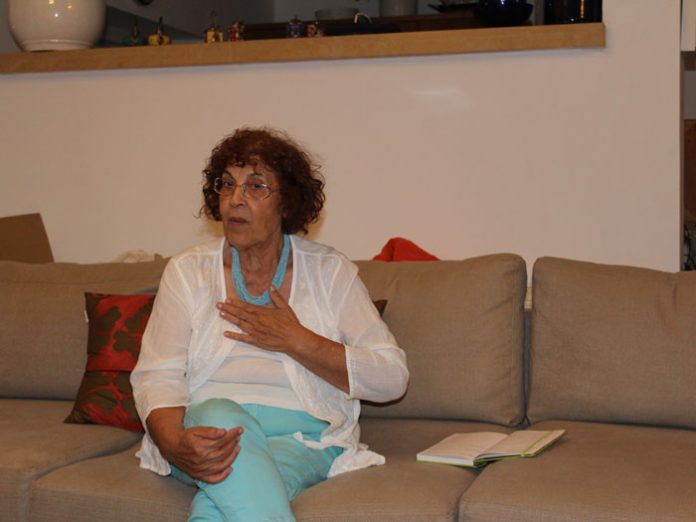Eli Cohen, the most famous Israeli spy, was executed by hanging on May 18, 1965. A few days prior to his execution, he penned this poignant letter to his wife and family, knowing that it would be his last.
To my dear Nadia and my dear family:
I am writing to you these last words, a few minutes before my end, and I would like to beg you to be forever united.
I request you, dear Nadia, to pardon me and take care of yourself and our children. Look after them thoroughly, bring them up and give them a complete education, don’t deprive them or yourself of anything.
Please be always in close communication with my dear parent.
You can get remarried in order not to deprive the children of a father. You have the full liberty to do so. I am begging you, my dear Nadia, not to spend your time in weeping about something already passed.
Concentrate on yourself, looking forward for a better future!
I send you my last kisses to you and to the children: Sophie, Irit, and Shaoul, and to the rest of my family, especially my mother…
Don’t forget also your dear family; give them my best regards.
Don’t forget to pray for the soul of my late father and of mine.
Receive my blessings to all of you.
Eli Cohen 15/5/1965
The crowd of thousands of rowdy Syrians standing in Damascus’s Marjeh (Martyrs’) Square waited impatiently for the “big” moment. Their deafening loud jeers didn’t drown out the anti-Semitic slurs being hurled at Israel’s prized spy, 41-year-old Eli Cohen, who having just concluded Viduy with the chief rabbi of Damascus, Rabbi Nissim Andabo, was being led by armed Syrian soldiers to the tall gallows erected in downtown Damascus in his honor.
The shouting grew more thunderous as the famed spy came into view. Parents passed out sweets among their children, while lively music played. Eli Cohen took his last few steps to the stool on which he’d stand for his execution. A noose was placed around his neck by a high-ranking Syrian government official who read the charges against Eli, who stood silently looking frightened. The images were broadcast live on Syrian TV and were being watched by thousands around the world.
Meanwhile in Bat Yam, Israel, only 135 miles away from Damascus, the Cohen family, Eli’s mother, his wife Nadia, and his siblings, sat huddled in the living room of their crowded apartment as their husband, son, and brother was led to the gallows to be killed for his crimes. Eli Cohen had sacrificed everything for his people and now the badly humiliated Syrians were about to take revenge. The Cohen family had tried every avenue they could think of to save Eli’s life, but the international effort had failed. There was no longer anything they could do. It was over. Eli was gone.
* * *
Today the sun is setting in the beautiful Israeli coastal town of Herzliya as I arrive at the address I am looking for and park my car nearby. I walk under an archway and up the stairs leading to a white stucco home whose door is opened by Mrs. Nadia Cohen, the elderly widow of Eli Cohen. Her home is impeccably clean and decorated in a modern style. Photos of Eli Cohen can be seen all over the house, his dark soulful eyes beaming out from each snapshot. Although Eli never lived in this home, his presence can be felt. Mrs. Cohen shows my wife and I to the living room where two large couches face each other on either side of the room; a glass coffee table is situated between them. “Please sit,” she says, as she heads into the kitchen. She emerges moments later, holding a tray with glasses of water. “Would you like a drink?” she asks. I politely decline. I am not thirsty for water. Today my thirst is for knowledge. I want the inside story of a legendary tale and I’m confident that I’m about to hear it. Mrs. Cohen takes a seat on the couch across from me and begins to ask us questions just the way any “savta” would. “Where are you from? How old are you? What does your father do?”
As I steer the conversation back to her, I realize that although it has been 53 years since her husband’s death, the years of sadness and pain have not dimmed her smile as she speaks about her late husband. The memories she retains are fresh and vivid, as if the events she describes in great detail occurred yesterday. The world may have forgotten Eli Cohen, the legendary spy, and the media doesn’t crowd around the Cohen home in droves like they used to, but Nadia Cohen lives and breathes this story each and every day of her life. After all, this is her life’s story.
“I’m 83 years old,” she says with the air of someone who is seasoned.
“How many children do you have?” I ask.
“We have three children.”
“Any grandchildren?”
“We have six grandchildren,” she says with pride as she points to a family photo on the wall. “Their ages range from four and a half to 32.”
“You must be very proud,” I offer.
She smiles. “You know, when I was growing up, I heard a tremendous amount about your husband. He was a legend,” I declare. She smiles again; this time, though, her smile doesn’t display the same amount of joy as her smile when I mentioned the grandchildren. “Can you share your story with me?” I request.
“I was born in Baghdad, Iraq. Eli was born in Alexandria, Egypt. I came to Israel in 1951 and Eli came in 1957. Eli’s brother was married to our neighbor’s sister. He would come to visit them often, and that’s how we were acquainted.”
“Can you tell me a little bit about him?” I ask. “What was Eli like?” “He was a very happy person, very smart. He figured things out really quickly, he really liked people, especially our nation and Judaism. He was also shomer masoret; he wasn’t very religious, but he was very traditional. He wanted to accomplish big things for his country.”
“How did he get involved with the Mossad?” I ask.
“During Eli’s time in Egypt, prior to his emigration to Israel, he worked for the Mossad.”
“Were you aware of this when you married him?” “Of course not,” she says. “It’s not like he just set foot in Israel and became a Mossad agent. He had been buying guns for the Israelis, arranging aliyah for Egyptian Jews, and he was involved with many other matters related to the Mossad.”
“Did you have any idea of what he was doing?” I ask, referring to his spy work with the Mossad. “I didn’t know about his trip to Argentina—that’s where he learned about Syrian culture and began to blend in with the Syrian community. He spent time in two parts of Buenos Aires. Originally he was in the Spanish parts, where he was taught everything he’d need to know, and then he spent time in the city’s Syrian neighborhoods, where he began to get acquainted with the right people in order to accomplish his mission.”





















